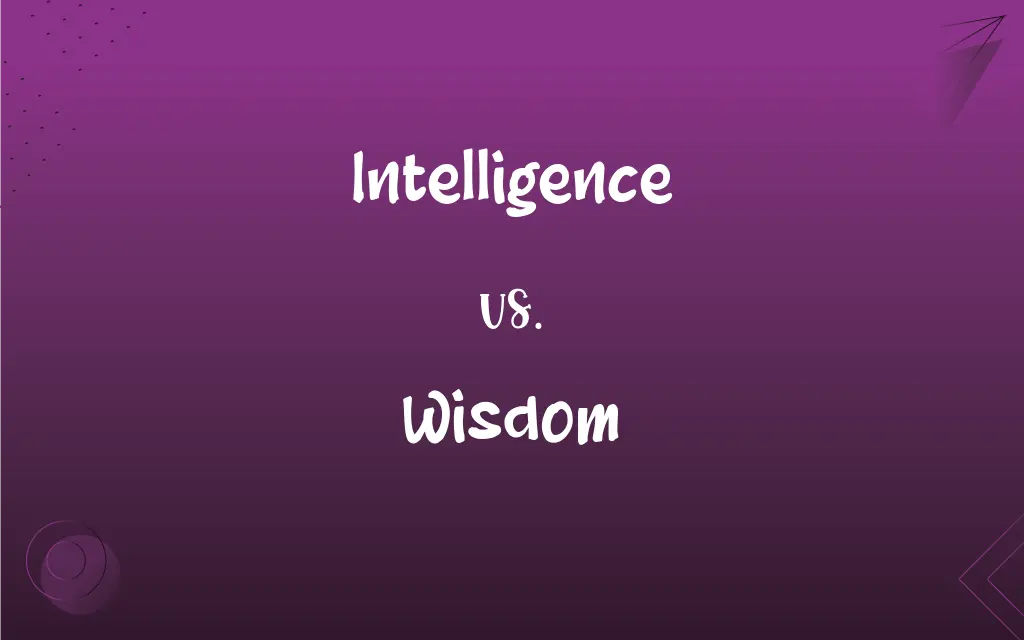Intelligence vs. Wisdom: What's the Difference?
Edited by Aimie Carlson || By Harlon Moss || Updated on October 8, 2023
Intelligence is the capacity to learn, understand, and apply knowledge, while wisdom involves choosing means that are suitable to achieve particular ends.

Key Differences
Intelligence is often viewed as the quickness in learning and understanding new information. It encapsulates cognitive abilities like problem-solving, analytical thinking, and the ability to grasp complex concepts quickly. In contrast, wisdom is perceived as the sagacity to make sound judgments and choices based on knowledge. It does not merely involve choosing means that serve particular ends but choosing means that are ethically and aesthetically superior.
On a practical level, intelligence might equate to how fast or efficiently someone can solve a mathematical problem. It represents the raw firepower of cognitive functioning and mental agility. Wisdom, however, would guide a person in recognizing whether the problem is worth solving in the first place, evaluating its relevance and importance in a broader context.
Furthermore, intelligence can be quantified to a certain extent through IQ tests and standardized exams. These evaluations measure aspects like logical reasoning, math skills, and vocabulary. Wisdom, however, doesn’t lend itself to quantification in the same way. It often intertwines with elements like emotional understanding, moral beliefs, and long-term vision, which are difficult to measure through testing.
Although intelligence may facilitate the acquisition of knowledge, wisdom is what guides how this knowledge is applied. An intelligent person might devise new technological innovations, formulate theories, or solve intricate problems. Wisdom, on the other hand, provides the prudence to determine how those innovations are implemented and ensures that they are utilized in a manner that is beneficial and ethical.
In various cultural contexts, intelligence is often associated with academic prowess and cognitive acumen. It’s seen as an inherent or learned ability to process information and solve problems. Wisdom is commonly linked with age and experience and is depicted as the ability to make judicious decisions, especially in complex and nuanced situations, utilizing both knowledge and ethical considerations.
ADVERTISEMENT
Comparison Chart
Fundamental Nature
Ability to learn and understand
Ability to make sound decisions
Association
Often linked with IQ
Frequently tied with experience/age
Application
Problem-solving and analytics
Involves moral and ethical choices
Measurement
Can be quantified (e.g., IQ)
Difficult to quantify accurately
Development
Can be developed through study
Typically accrues with experience
ADVERTISEMENT
Intelligence and Wisdom Definitions
Intelligence
The capability of adapting knowledge to manipulate one’s environment.
The scientist used his intelligence to innovate sustainable energy solutions.
Wisdom
The ability to discern or judge what is true, right, or lasting.
Her wisdom led her to make ethical business choices.
Intelligence
The ability to handle complex ideas and adapt to changing situations.
His intelligence enabled him to navigate through various career paths successfully.
Wisdom
The quality of having experience, knowledge, and good judgment.
The elder's wisdom was respected in the community.
Intelligence
The ability to acquire and apply knowledge.
Her intelligence allowed her to master multiple languages.
Wisdom
Knowledge of what is true or right coupled with just judgment.
His wisdom prevented the team from making a hasty, ill-informed decision.
Intelligence
The capacity for learning, reasoning, and understanding.
His intelligence was evident through his quick problem-solving skills.
Wisdom
The soundness of an action or decision with regard to the application of experience.
The wisdom of her decision was proven by the project’s overwhelming success.
Intelligence
Aptitude in grasping truths, relationships, facts, or meanings.
Her intelligence in economic theories resulted in profitable investments.
Wisdom
The ability to make sensible decisions and give good advice due to the experience and knowledge possessed.
He offered wisdom to the youth, steering them towards positive paths.
Intelligence
The ability to acquire, understand, and use knowledge
A person of extraordinary intelligence.
Wisdom
The ability to discern or judge what is true, right, or lasting; insight.
Intelligence
Information, especially secret information gathered about an actual or potential enemy or adversary.
Wisdom
Common sense; good judgment
"It is a characteristic of wisdom not to do desperate things" (Henry David Thoreau).
Intelligence
The gathering of such information
"Corporate intelligence relies on a slew of tools, some sophisticated, many quite basic" (Neil King and Jess Bravin).
FAQs
How is intelligence commonly measured?
Intelligence is often measured using IQ tests and other standardized tests that assess cognitive abilities.
Is intelligence a predictor of wisdom?
Not necessarily. While intelligent individuals can possess wisdom, the two traits develop differently and aren’t always correlated.
Can wisdom be developed in the same way as intelligence?
Wisdom is generally developed through lived experiences and reflection, rather than through structured learning and study, as is common with intelligence.
Can someone be wise but not intelligent, or vice versa?
Yes, it's possible to have high intelligence but lack wisdom, and vice versa, as they pertain to different types of understanding and decision-making.
Can intelligence be improved?
Yes, intelligence can be improved with consistent learning, problem-solving exercises, and engaging in intellectually stimulating activities.
Can wisdom be taught?
Wisdom is often developed through experiences and reflections, but insights and perspectives that cultivate wisdom can be shared and taught to some extent.
How do educational systems typically value intelligence and wisdom?
Educational systems often place a heavy emphasis on intelligence, measured through exams and assessments, while wisdom may be nurtured more implicitly through social interactions and experiences.
How does society typically reward intelligence and wisdom?
Society often rewards intelligence through accolades in academic and professional realms, while wisdom may be revered and respected, especially in social and relational contexts.
How does emotional intelligence relate to intelligence and wisdom?
Emotional intelligence involves recognizing, understanding, and managing emotions, which can enhance cognitive intelligence and contribute to developing wisdom through improved interpersonal relationships.
What role does intelligence play in creative processes?
Intelligence can facilitate creative processes by enabling the individual to learn, analyze, and synthesize information in innovative ways.
Can intelligence and wisdom conflict with each other?
Potentially, yes. For instance, a technically intelligent solution might lack foresight or ethical considerations that wisdom might highlight.
Are intelligence and wisdom valued similarly across different cultures?
Cultural perceptions of intelligence and wisdom can vary widely, with some cultures valuing one over the other or valuing them in different contexts.
What role does wisdom play in leadership?
Wisdom in leadership involves making judicious, ethical, and sustainable decisions, considering both immediate needs and long-term impacts.
How does age relate to intelligence and wisdom?
While intelligence can be present at any age, wisdom is often associated with the insights and perspectives gained through lived experiences over time.
What role does wisdom have in social relationships?
Wisdom can facilitate healthy social relationships by guiding individuals towards understanding, empathy, and making judicious decisions in interpersonal interactions.
Can one be considered universally intelligent or wise across all cultures and contexts?
Not necessarily. Concepts of intelligence and wisdom can vary significantly across different cultures and contexts, leading to different appreciations and recognitions.
Can a person’s wisdom and intelligence be fully known or assessed?
While aspects of intelligence can be measured through testing, fully understanding a person’s total intelligence or wisdom is complex and may not be fully captured through assessments.
Can wisdom be applied to technological and scientific advancements?
Yes, wisdom can guide the ethical development, implementation, and usage of technological and scientific advancements to ensure they are beneficial to society.
Is wisdom always associated with morality?
Often, yes. Wisdom tends to encompass an understanding of what is true and right, thus involving a moral or ethical dimension.
How do different philosophical traditions view intelligence and wisdom?
Different philosophical traditions have varied perspectives, with some valuing the theoretical and analytical aspects of intelligence and others placing higher esteem on the experiential and moral aspects of wisdom.
About Author
Written by
Harlon MossHarlon is a seasoned quality moderator and accomplished content writer for Difference Wiki. An alumnus of the prestigious University of California, he earned his degree in Computer Science. Leveraging his academic background, Harlon brings a meticulous and informed perspective to his work, ensuring content accuracy and excellence.
Edited by
Aimie CarlsonAimie Carlson, holding a master's degree in English literature, is a fervent English language enthusiast. She lends her writing talents to Difference Wiki, a prominent website that specializes in comparisons, offering readers insightful analyses that both captivate and inform.
































































